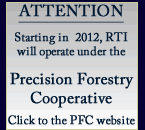
|
Washington Forest Futures:
Economic Contribution Study
Washington Forest Futures: Economic Contribution Study PDF
A complex
mix of forest landowners and the forest products industry has
always been important contributors to the Washington state economy,
particularly in rural, timber-dependent areas. The role of the
forest sector in the state’s economy can be captured in
several ways, such as analyzing changing business level measures
collected in state statistics and by understanding the linkages
between the forest sector and the state’s economy as best
characterized by input/output and econometric models. In this
study, we will assess the current role of the primary and value-added
wood industries in the Washington economy and their relative
contributions over time, based on the state’s sector level
data, and project their likely contribution in the near future
using input from the Timber Supply and Forest Structure Study.
CINTRAFOR research has projected an expansion of primary industry
investments (Perez-Garcia 2003, 2004). We will link investment
potential to future economic contributions and their impact on
value-added wood industries and classes of forest landowners.
While changes in definitions have compounded the problem of developing
statewide economic models, the available data sets provide insights
into the changing structure of the forest sector, its disparate
owners, and the state’s economy.
Methodology
Data that
will be used to conduct the study:
-
Time series of Washington
economic data to develop the best possible links with existing
state economic models in consultation with state modelers.
-
Timber
Supply and Forest Structure Study results to project future
contributions.
-
Gross
Business Revenue (GBR), value-added, and employment data
from the Department of Revenue from 1980-2004, by industry
sector
and region of the state.
-
Business trends of the various
classes of forestry and wood products sector relative
to other major sectors within the Washington economy.
-
Changing
business trends with reference to the Competitive
Position and Timber Supply studies to identify key factors
driving change
within specific industry sectors.
-
Economic impact of
forest activity across rural and urban regions,
for assessing income disparity between timber-dependent and
urban communities.
Anticipated Outputs:
-
Description of the role of
the forestry and forest products sector and its various ownerships
in the economy of Washington.
-
Analysis of the economic
contribution of the forest products industry on a regional
basis (including
timber-dependent regions and communities
relative to urban areas).
-
Description
of changes over time in key drivers at
both the state and county level, using urban and rural distinctions.
-
Projection
of the contribution of forestry and
logging, primary manufacturing, and secondary manufacturing
into the near future.
-
Analysis
of regional economic and productivity
trends such as wage costs and productivity across stages of
processing.
-
Economic
impact analysis table (gross product,
income, direct and indirect jobs, and taxes) related to forest
sector activity levels.
-
Business-as-usual
projection for the Washington
forest products sector, identifying those factors and policies
that constrain investment within
the industry.
|
|
|
The Rural Technology Home Page is provided by the College of Forest
Resources. For more information, please contact the Rural
Technology Initiative, University of Washington Box 352100 Seattle,
WA 98195, (206) 543-0827. © 2000-2004, University of Washington, Rural
Technology Initiative, including all photographs and images unless otherwise
noted. To view the www.ruraltech.org privacy policy, click
here.
|








